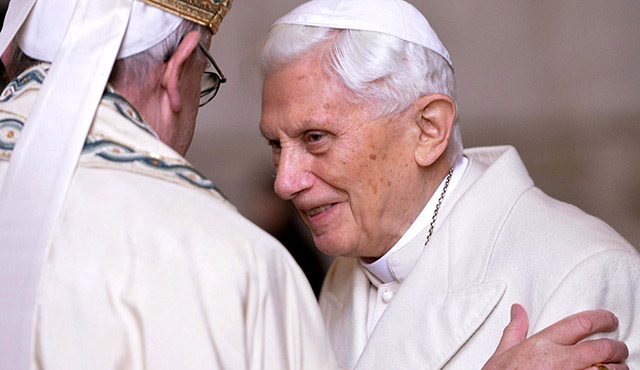Last month I was riding my bicycle around our neighborhood on a Sunday afternoon. The late spring afternoon sunshine cast a golden hue on the green shrubbery. I was thinking about the usual things—work, home, family, God. My book about Benedict XVI, Father Benedict, had been out now for a few months, and following the diocesan book club event featuring it in April, it was time to look for a new project. But when you love someone, how can you simply excise them from memory?
There had been some minute controversy about what to call the first pope to resign in 600 years. Officially, it’s Pope Emeritus. But there exists an interview in which the retired pope said that if we had more strength he would have pushed the name “Father Benedict.” I don’t think he meant it literally, only to indicate that he was once again what he always had been—a priest, just like any parish priest in your hometown. Popes aren’t kings or presidents. They are not immortal or immune to human frailties. They are priests.
They are fathers.
How often are priests wished a “Happy Father’s Day” on the annual Sunday holiday in June? But as their title indicates, that’s exactly what they are—fathers to those entrusted to them. I believe this is what Benedict XVI meant when he suggested “Father Benedict”—I am and always have been a priest. I don’t need a fancy title. Just call me “Father.”
This Father’s Day marks the seventh without my own father. It dawned on me while biking the deceptively hilly Yorba Linda streets in May—two years after finishing the first draft of Father Benedict—that the title I chose for the book was two-fold: Benedict XVI as priest, but also Benedict XVI as father.
For it was holding vigil in the final days of my own father’s life at his hospital bedside in March 2011 when I broke open Benedict’s Light of the World, which my mother had on loan from the library. “Yes, I heard about this,” I thought, vaguely remembering the resounding negative reviews it got in the press—and yet in those days between the wrenching witness of suffering—a tangible encounter of crucifixion—and discovering the wisdom of Benedict XVI, reflecting the wisdom of the Church, something of a resurrection materialized: Catholicism suddenly became less a parallel abstraction to the realities of my everyday life than, simply, life itself.
My father’s final earthly gift when he died on March 19 was to introduce a new spiritual father—Joseph Ratzinger, Benedict XVI, whose namesake is that day’s feast—the Feast of St. Joseph. The personhood of St. Joseph as a foster father, living as a good father does by example became real: the hard working carpenter, obedient to the will of the Father, trusting his spouse, loyal to the Torah, and open to divine creativity, so influenced he was by his dreams (Mt. 1:20-21, 2:13, 2:19-20, 2:22).
Speaking that very day to at the conclusion of the annual Lenten retreat in the Vatican, Benedict XVI told the Roman Curia, “St. Matthew describes St. Joseph with one word: he was a ‘just’ man, dikaios, who lives in the word of God and does not experience the Law as a ‘yoke’ but rather as a ‘joy.’
“When one has experienced a great joy,” Benedict said elsewhere, “he cannot keep it to himself, he must pass it on to others.” That, in essence, is the theme of fatherhood: from earthly fathers who have guided us in our own life to spiritual fathers who offer us the Sacraments, each pass on the joy of life—zoë, as Benedict XVI pointed out in Jesus of Nazareth, Part Two—real life, life itself.
“Eternal life’ is life itself, real life, which can also be lived in the present age and is no longer challenged by physical death,” he writes in that masterpiece.
There is a line in the recent blockbuster, Wonder Woman, that struck me. Steve Trevor (Chris Pine) hands Diana (Gal Gadot) his wristwatch. “I wish we had more time. I love you.” Too often we relegate our life to the bios—the period of physical time on this earth rather than the zoë, and suddenly what we thought was “all the time in the world” has vanished. “This is the point: to seize life here and now,” Benedict writes.
May we embrace the transcendent around us waiting to be discovered, in gratitude for the fathers in our lives—and those awaiting us in the life of the world to come.

